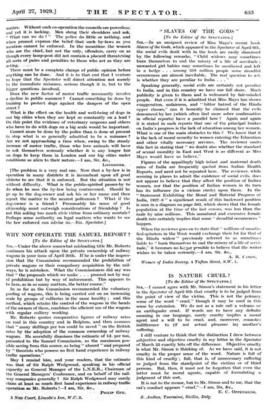" SLAVES OF T i to!. GODS " [To the Editor of
the SPECTATOR.] an unsigned review of Miss Mayo's recent book Slaves of the Gods, which appeared in the Spectator of April 6th, the social evils dealt with in the book are easily dismissed by the following remarks, " Child widows may sometimes burn themselves to end the misery of a life of servitude ; unwanted girl babies may sometimes be smothered and left in a hedge . . . among 318 million people some dreadful occurrences are almost inevitable. The real question to ask is whether they are peculiar to India . . .
Speaking generally, social evils are certainly not peculiar to India, and in this country we have our full share. Much publicity is given to them and is welcomed by fair-minded people. But even if it is admitted that Miss Mayo has shown exaggeration, unfairness, and " bitter hatred of the Hindu upper classes," can it honestly be claimed that the evils denounced by her (which often find more sober confirmation in official reports) have a parallel here ? Again and again it is stated in such reports that one of the principal brakes on India's progress is the lack of education among her women. What is one of the main obstacles to this ? We know that it is the lack of moral security to women entering the Education and other vitally necessary services. The reviewer omits this fact in stating that we doubt also whether the standard of sexual morality in East and West is as different as Miss Mayo would have us believe."
Figures of the appallingly high infant and maternal death rates of India are frequently quoted from Indian Health Reports, and need not be repeated here. The reviewer, while seeming in places to admit the existence of social evils, does not appear to believe that they affect the position of Indian women, nor that the position of Indian women in its turn has its influence (in a vicious circle) upon them. In the " Statement Exhibiting the Moral and Material Progress of India, 1927-8 " a significant result of this backward position is seen in a diagram on page 363, which shows that the female population at the time of the last census, was less than the male by nine millions. This unnatural and excessive female death rate certainly implies that some " dreadful occurrences " happen.
When the reviewer goes on to state that " millions of unsatis- fied spinsters in the West would exchange their lot for that of the Hindu widow " previously referred to as sometimes liable to " burn themselves to end the misery of a life of servi- tude," it becomes no kz-.2,er possible to believe that the writer wishes to be taken seriously.—I am, Sir, &c.,








































 Previous page
Previous page